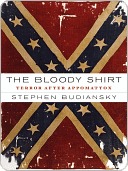
The Bloody Shirt
Terror After the Civil War
کتاب های مرتبط
- اطلاعات
- نقد و بررسی
- دیدگاه کاربران
نقد و بررسی

September 10, 2007
Journalist and military historian Budiansky (Her Majesty's Spymaster
) pulls no punches in this hard-hitting examination of the most sordid aspects of Reconstruction in the South from 1865 to 1876. The “brutal war of terrorist violence” that he surveys certainly has not escaped the history books. But this worthy effort goes a long way toward highlighting the most venal aspects of how, in the 10 years after the Civil War, the white Southern power structure managed to erect the Jim Crow laws that for nearly a century legalized many aspects of racial discrimination. Budiansky also highlights “men and women of courage, idealism, rectitude, and vision” who confronted the establishment: Pennsylvania-born U.S. Army major Lewis Merrill, who fought the Ku Klux Klan in South Carolina; Prince Rivers, a former slave and Union army Colored Troop sergeant who became a state legislator and trial judge in South Carolina; and Maine-born Adelbert Ames, a Union general who served as Mississippi's provisional military governor. Budiansky brings the unpleasant details of the era alive in a smoothly written narrative.

November 15, 2007
Though not a comprehensive history of Reconstruction, Budianskys treatment of the period illustrates withforce how theSouthultimatelydefeated the North politically. He achieves the effectby relayingthe experiences of severalpeople whoserved or supported Reconstruction governments andconjuring the atmosphere of intimidation against Reconstruction with quotationsfrom Southern newspapers. Also quoting reports about disorder filed by two federal army officers, Lewis Merrill and Adelbert Ames, Budiansky conveys in detail the opposition and local insurrections that officials of Reconstruction regularly confronted: Merrill investigated the Ku Klux Klan, while Ames, as governor of Mississippi, faced recurrent white mob violence against Northerners and blacks. The spectacle of the whites anti-black campaigns comes most grimly into focus in Budianskys account of an 1876 massacre of blacks in a South Carolina town, until then run by an ex-slave named Prince Rivers.He survived, butthe robbery of his rights stokes Budianskys intense historical indignation about the overthrow of Reconstruction. Notable for espionage histories, the versatileauthor extends his range with this passionate history of the Civil Wars aftermath.(Reprinted with permission of Booklist, copyright 2007, American Library Association.)

























دیدگاه کاربران